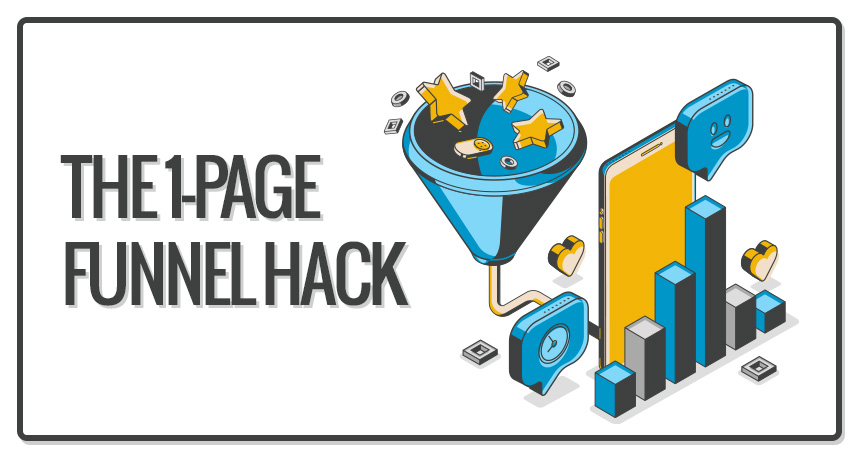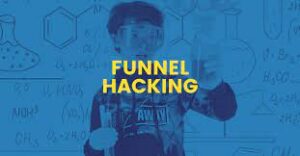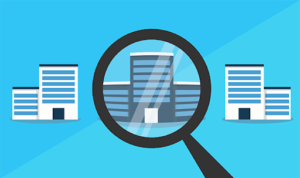What is Sales Funnel Hacker: Best Guide to Marketing Funnels

A funnel hacker is someone who examines and adopts a competitor’s sales strategy to boost their sales. By leveraging similar tactics, they aim to achieve faster results while minimizing risks.
The core concept of funnel hacking revolves around generating more leads and driving revenue growth by emulating successful strategies. The key approach involves studying competitors to identify their effective methods and then implementing similar marketing and sales tactics to elevate your own business. By adopting proven techniques, you can aim to propel your business to new heights.
What is a Funnel Hacker?
A funnel hacker is an individual who conducts research and analysis on their competitors’ sales and marketing processes. The goal is to gain knowledge, model, and test similar strategies within their own sales and marketing approaches.
Funnel hackers are skilled marketers who strategically examine and analyze their competitors’ sales funnels to enhance their own marketing and sales strategies. They possess expertise in comprehending the nuances of their competitors’ marketing tactics and leverage that knowledge to optimize their success. Key activities conducted by funnel hackers include:
- Examining email sequences
- Investigating website technologies
- Analyzing their landing page and sales pages
- Studying incoming traffic, ad campaigns and strategies
- Testing and optimizing conversion funnels
What is funnel hacking?

Hacks are known for simplifying tasks and helping achieve goals more easily in the business world. Funnel hacking follows a similar principle.
In essence, funnel hacking involves conducting comprehensive research into your competitors’ sales and marketing strategies. You then adapt and test those processes within your own company.
The significance of funnel hacking lies in gaining valuable insights into your competitors’ practices and identifying what is effective (or ineffective) for them. This information can be utilized to shape and customize their approaches into strategies that work best for your own business.
Now, let’s explore the exciting aspect of funnel hacking as we provide a step-by-step guide on how to effectively analyze and learn from your competition’s methods.
Thorough research provides the necessary clarity to make informed decisions that drive your business forward. Countless marketers have experienced unproductive hours, and it’s important to avoid going through the same situation.
By investing time in comprehensive research, you can avoid wasting efforts and ensure that your decisions are well-informed and effective in propelling your business toward success.
How To Become a Funnel Hacker?
Funnel hacking is a crucial skill for entrepreneurs aiming for success. It involves the practice of deconstructing and analyzing effective sales funnels and then replicating their techniques to develop your own.
1. Learn About The Process
To begin your journey in funnel hacking, it is essential to acquire a solid understanding of the fundamentals and the art behind this process. Taking a dedicated funnel hacking class is an excellent way to gain comprehensive knowledge and insights into this business strategy. Additionally, you can explore educational resources such as books, podcasts, and videos that cover the topic in-depth.
It is crucial to pay attention to detail and ensure a thorough understanding of the process before proceeding to the next steps. Avoid the temptation to rush or take shortcuts in the learning process. Building a strong foundation is vital before implementing funnel hacking techniques on your funnel.
Start by experimenting with various methods and strategies on your funnel. Through testing and analysis, you can refine and optimize your approach to achieve better results.
2. Find Competitors To Investigate
Examining your competitors is a valuable approach to becoming a proficient funnel hacker and gaining a competitive edge in your industry.
Start by analyzing your most successful competitors to uncover the strategies they employ to achieve results. Study their marketing tactics, website design, and overall operational approach. Additionally, delve into customer feedback and reviews to gain insights into their strengths and weaknesses. This research can serve as a valuable resource for enhancing your business model and identifying effective practices within your industry.
Another effective method is studying companies that have faced failures within your industry. By understanding the reasons behind their lack of success, you can learn from their mistakes and avoid making similar missteps. This research will provide you with a deeper understanding of the market landscape and offer ideas for improving your business model.
3. Go Through Every Funnel
To become a proficient funnel hacker, it is crucial to thoroughly examine various types of funnels. Each funnel presents unique strategies and approaches, and gaining a comprehensive understanding of all these variations is essential. By immersing yourself in the examination of each funnel, you can identify effective and ineffective elements, enabling you to grasp what works best.
Furthermore, this process allows you to identify any gaps in your knowledge and address them accordingly. Going through every funnel serves as an effective method to become a skilled funnel hacker.
Remember to take detailed notes throughout the process. These notes will prove invaluable later on when you need to recall and apply the knowledge you have acquired.
4. Learn About Their Sales Triggers
Sales triggers encompass several factors that can influence customer behavior:
- Need: Customers recognize a problem and perceive your product as a solution.
- Want: Customers experience a desire or attraction towards your product, even if it isn’t a necessity.
- Urgency: Customers feel compelled to purchase your product due to a time-sensitive offer or deadline.
- Scarcity: Customers perceive the limited availability of your product, creating a sense of urgency to make a purchase.
Acquiring knowledge about sales triggers as an entrepreneur can empower you to become an effective funnel hacker. Understanding these triggers allows you to develop targeted marketing campaigns that appeal to customers’ specific needs, wants, sense of urgency, and perception of scarcity. By leveraging this knowledge, you can optimize your funnel to convert a higher number of leads into paying customers.
5. Find The Right Funnel For Your Needs
After conducting thorough research, the next step is to identify the appropriate funnel that aligns with your needs. Look for a funnel that has demonstrated success within your industry and meets criteria such as low entry cost, high value proposition, and ease of setup and usage. Once you have chosen the right funnel, you can begin your journey as a funnel hacker, applying your findings and strategies to achieve your business goals.
6. Mimic Their Work
The final step in becoming a funnel hacker is to imitate the successful strategies of your competitors. This involves closely examining how they acquire new customers and increase their conversion rates. By mimicking their approach, you can gain insights into their operational methods and what contributes to their success. This hands-on experience is the best way to learn the art of funnel hacking.
However, it is not enough to merely replicate their work. It is equally important to understand the underlying principles that make their strategies effective. By comprehending these principles, you can adapt and apply them to your own business, leading to tangible results.
Becoming a skilled funnel hacker requires learning the trade. It is crucial to thoroughly investigate and analyze strong competitors, studying each of their funnels. Understanding their sales triggers is key in selecting the appropriate funnel for your own business. Once you have completed these steps, you can confidently imitate your competitors’ strategies to achieve similar results.
7. Test and optimize
Get familiar with funnel-building software like ClickFunnels, Leadpages, or other similar tools. Experiment with building your own funnels and test different variations to see what works best.
Implement A/B testing and conversion rate optimization strategies to improve your funnels. Test different elements such as headlines, visuals, calls-to-action, and pricing to find the most effective combinations.
The Funnel Hacker’s Toolkit

A key principle of Funnel Hacking is enabling non-technical team members to iterate quickly and independently, without relying on developers. This principle is supported by the Funnel Hacker’s toolkit, which separates business logic from code, allowing decision-makers to make changes without the need for coding or software releases. By accessing the appropriate tools within the Funnel Hacker’s toolkit, non-technical team members can effectively manage and modify the business logic, addressing challenges such as the encapsulation of business logic in startups.
1. The Customer Funnel
Funnel Hacking introduces an 8-stage funnel that can be applied to various businesses. Its strength lies in providing a framework and shared terminology to facilitate discussions about necessary actions and strategies. This standardized approach enables businesses to align their efforts and effectively address their specific needs within the context of the funnel.
- discovery
- Familiarity
- Trial
- Support
- Purchase
- Upsell
- Return
- Refer
In Funnel Hacking, significant emphasis is placed on the seven stages following the initial Discovery phase. One common mistake observed among startups is an excessive focus on driving traffic to their website through Growth Hacking tactics. However, they often face a challenge in retaining leads throughout the subsequent stages of the funnel, namely Familiarity, Trial, Support, and Purchase. Addressing this issue is crucial for optimizing funnel performance and maximizing conversions.
Neglecting the subsequent stages of the customer funnel can have adverse effects on a startup’s bottom line and investor perception. By failing to effectively navigate the funnel stages of Upsell, Retain, and Refer, businesses miss out on opportunities to maximize customer revenue and unlock the full potential of Customer Lifetime Value (LTV).
A proficient Funnel Hacker recognizes the importance of staying updated on the latest tools available in the market. They understand the strengths and weaknesses of each tool, enabling them to make informed decisions about which ones to leverage in order to optimize their funnel and drive better results. This proactive approach ensures that businesses can capitalize on opportunities and enhance their overall funnel performance.
2. Fit for Purpose Tools
A crucial aspect of Funnel Hacking is the ability to select the most appropriate tools for your business and integrate them intelligently. This involves establishing seamless information exchange between the tools, enabling a comprehensive understanding of each user on your platform. It is essential to retain the best-of-breed tools for each specific capability, rather than opting for monolithic applications that claim to do everything but lack excellence in any particular area. By adopting this approach, businesses can optimize their funnel and achieve superior results.
3. Playbooks
A playbook serves as a documented process designed to achieve desired outcomes for one or more stages within the Customer Funnel. It provides a comprehensive overview of the end-to-end process and illustrates how different tools interact with one another, addressing the challenge of maintaining cohesion within a startup (Startup Problem #4: The Cohesion Vacuum).
A playbook is typically triggered by a specific event, often originating from the startup’s platform. However, it can also be triggered by events from key tools such as the billing system or NPS (Net Promoter Score) tool. To construct effective playbooks, a Funnel Hacker must identify all the relevant events and data to be transmitted from the startup’s platform.
Optimally constructing these events requires an understanding of the current and future goals of the startup. This ensures that the events are designed to meet current needs while also accommodating future initiatives from product, marketing, and success team members, all without requiring developer intervention. This flexibility empowers the startups to implement initiatives and achieve their goals efficiently.
4. Single View of a Customer
Thanks to integration tools like Segment and Zapier, the goal of creating a unified view of the customer is now within reach. Various tools can be utilized to achieve this, and the provided image, extracted from Drip, showcases the events attributed to a specific customer.
By consolidating all customer actions and profile data into a tool like this, it becomes possible to construct highly personalized flows that can target specific goals within the customer funnel. These goals include converting customers during the trial phase, upselling existing customers, re-engaging and retaining customers, as well as soliciting customer referrals. This level of personalization enables businesses to optimize their customer interactions and enhance overall funnel performance.
Analytics and Tracking Tools
Ghostery and BuiltWith Technology Profiler are two Chrome extensions that offer valuable insights into the technologies and tracking tools utilized on websites.
Ghostery allows users to gain a deeper understanding of the pixels and trackers employed, enabling them to make informed choices regarding their online privacy.
On the other hand, BuiltWith Technology Profiler provides comprehensive information about the technologies employed on a webpage, encompassing programming languages, advertising pixels, and analytics. Both extensions empower users to make more informed decisions and gain a better understanding of the technological landscape of the websites they visit.
Real-Life Success Stories of Funnel Hackers
E-commerce Funnel Hacking
E-commerce funnel hacking involves the dynamic process of improving a customer’s path through an online store to increase the chances of a successful purchase. It entails optimizing the various stages of the customer journey to enhance conversion rates and overall sales performance.
B2B Lead Generation Funnel Hacking
Incorporating innovative tactics such as survey funnels, B2B marketers can effectively generate leads of high quality, resulting in conversions and paying customers.
Survey funnels involve posing a series of questions to potential leads, enabling marketers to assess their needs and preferences. This information allows for the customization of marketing messages and offers to align with their specific requirements.
One inspiring case study highlights a B2B company that successfully utilized survey funnels to generate a consistent flow of top-notch leads, resulting in increased sales and revenue. Through a focus on comprehending their target audience and delivering personalized marketing experiences, this company achieved remarkable outcomes.
Affiliate Marketing Funnel Hacking
Affiliate marketing is an industry where implementing funnel hacker strategies can yield remarkable outcomes.
Marketers can achieve recurring income and expand their affiliate networks by examining and optimizing the sales funnels of successful affiliates.
In the context of affiliate marketing funnel hacking, the use of bridge funnels is a prevalent and effective tactic. These funnels act as a bridge between the affiliate’s marketing strategy and the promoted product or service.
By closely studying and emulating the techniques of prosperous affiliates, entrepreneurs can develop high-performing affiliate marketing funnels that generate passive income consistently.
Funnel Hacker Cookbook

The Funnel Hacker Cookbook is a comprehensive guide that provides step-by-step instructions and strategies for successful funnel hacking. It serves as a valuable resource for individuals and businesses looking to optimize their sales funnels and increase conversions.
The cookbook covers a wide range of topics, including:
- Funnel selection: How to identify the most suitable funnel for your specific business needs and goals.
- Funnel implementation: Step-by-step instructions on setting up and configuring your chosen funnel.
- Traffic strategies: Techniques for driving targeted traffic to your funnel, including paid advertising, social media marketing, and content creation.
- Conversion optimization: Tips and tactics to increase conversion rates at each stage of the funnel.
- Retention and customer lifetime value: Strategies for maximizing customer value, increasing retention rates, and generating repeat business.
- Tools and technology: Recommendations for the best tools and software to support your funnel hacking efforts.
Funnel Hacker Lab is your shortcut to get your funnel up and running
What is Funnel Hacker TV’s aim?
Funnel Hacker TV is a video series produced by ClickFunnels, a popular marketing and sales funnel software company.
Funnel Hacker TV aims to inspire, educate, and entertain viewers by showcasing real-world examples of successful funnel hacking and providing actionable tips and strategies that businesses can implement in their own marketing and sales funnels.
